- Your cart is empty
- Continue Shopping
Why My Betta Fish Died ? – 2023

Why My Betta Fish Died ? : - Betta fish, also known as Siamese fighting fish, are popular pets due to their bright colors and unique personalities. However, it can be devastating when a betta fish dies unexpectedly. If you're wondering why your betta fish died, there could be a number of reasons. In this article, we'll explore some common causes of betta fish death and what you can do to prevent it.
Poor water quality
One of the most common reasons for betta fish death is poor water quality. Betta fish are sensitive to changes in their environment, and dirty or polluted water can be deadly. To keep your betta's water clean, you should regularly perform water changes and use a good quality water conditioner to remove chlorine and other harmful chemicals. You should also avoid overfeeding your betta, as excess food can lead to a build-up of waste in the tank.
Lack of oxygen
Betta fish need access to oxygen in order to survive. If the water in your tank is not properly oxygenated, your betta may struggle to breathe and could eventually die. To ensure that your betta has enough oxygen, you should use an air pump and check that the water is well-circulated.
Disease
Betta fish are prone to a variety of diseases, including fin rot, ich, and fungal infections. If your betta is showing signs of illness, such as lethargy, loss of appetite, or changes in appearance, you should take them to a veterinarian as soon as possible. Early treatment can often help to prevent the disease from becoming fatal.
Stress
Betta fish can become stressed for a number of reasons, including overcrowding, improper tank conditions, and lack of stimulation. Stress can weaken your betta's immune system and make them more susceptible to illness. To reduce stress, you should provide your betta with a spacious and well-maintained tank, and consider adding some decorations or toys to keep them entertained.
Age
Like all living things, betta fish have a lifespan and will eventually die of old age. The average lifespan of a betta fish is 3-5 years, although some can live longer with proper care. If your betta has reached the end of their lifespan, there is unfortunately nothing you can do to prevent its death.
Improper diet
A proper diet is essential for the health of your betta fish. Betta fish are carnivorous and require a diet that is high in protein. Feeding your betta a diet of solely flakes or pellets may not provide them with the nutrients they need and can lead to health problems. Live or frozen foods, such as brine shrimp or bloodworms, can be a good source of protein for your betta. However, it is important not to overfeed your betta, as excess food can lead to a build-up of waste in the tank.
Temperature fluctuations
Betta fish are tropical fish and require a consistent water temperature to thrive. Water that is too cold or too hot can be harmful to your betta and may even lead to death. It is important to use a water heater to maintain a stable temperature in your betta's tank, and to avoid placing the tank in direct sunlight or near drafts.
Inadequate tank size
Betta fish require a minimum tank size of 2.5 gallons, although larger tanks are generally better for their health and well-being. Keeping your betta in a tank that is too small can lead to a variety of problems, including poor water quality, lack of oxygen, and stress.
Aggression from other fish
Betta fish are known for their territorial behavior and may become aggressive toward other fish. If your betta is placed in a tank with fish that are too large or aggressive, they may become bullied or attack other fish, leading to injury or death. It is important to research the compatibility of different fish species before adding them to your tank.
Genetics
In some cases, betta fish may be prone to certain health issues due to genetics. If you have purchased your betta from a reputable breeder, they should be able to provide information on any known genetic issues in the fish's lineage. However, even with proper care, some bettas may still be more prone to certain health problems due to genetics.

By understanding the potential causes of betta fish death and taking proper care of your fish, you can help to ensure that they live long and healthy life. Regular water changes, proper diet, and tank conditions, and keeping an eye out for signs of illness or stress can all contribute to the well-being of your betta.
In conclusion, there are several factors that can contribute to betta fish death. By taking good care of your betta and being vigilant for signs of illness or stress, you can help to ensure that your betta lives a long and healthy life.

